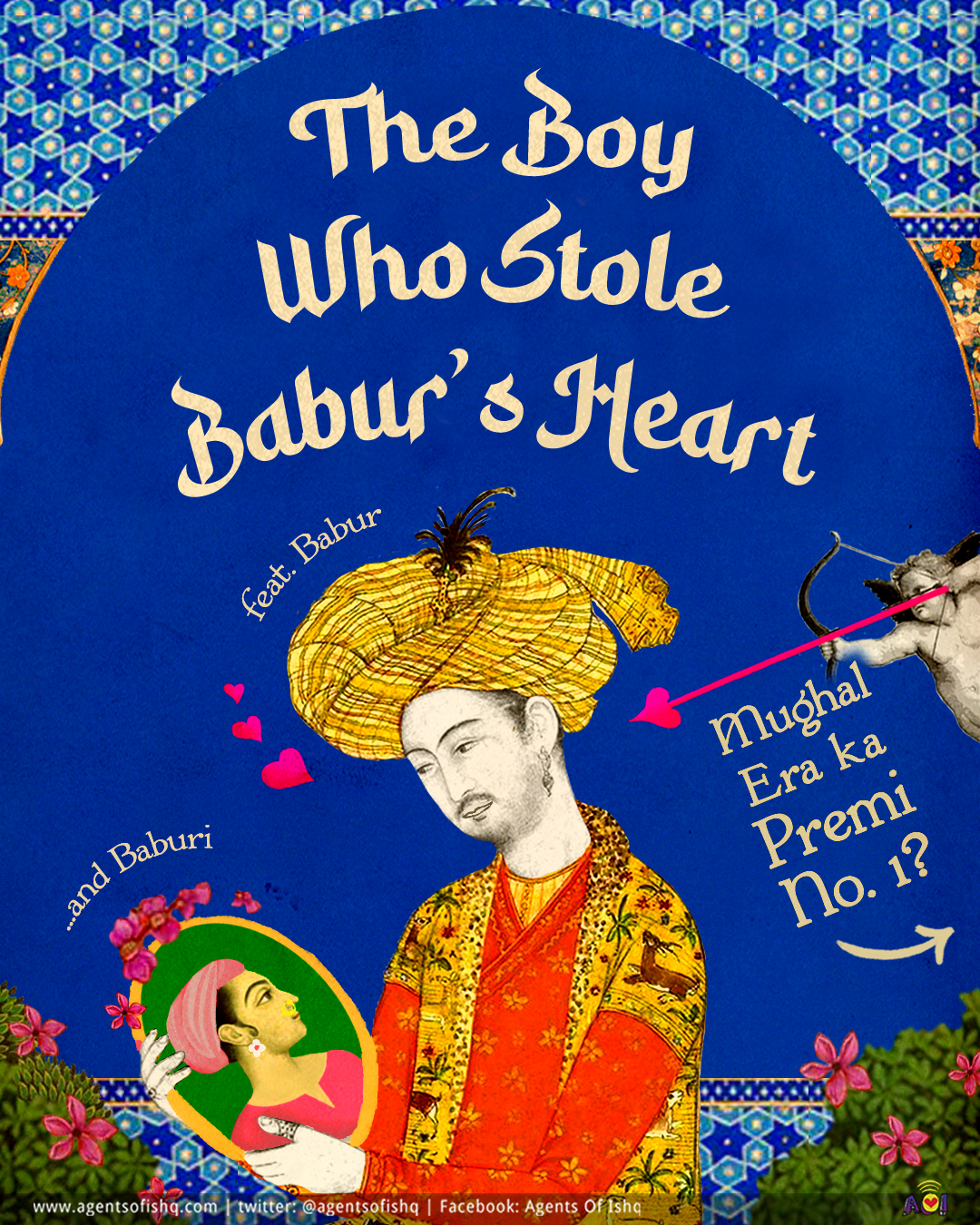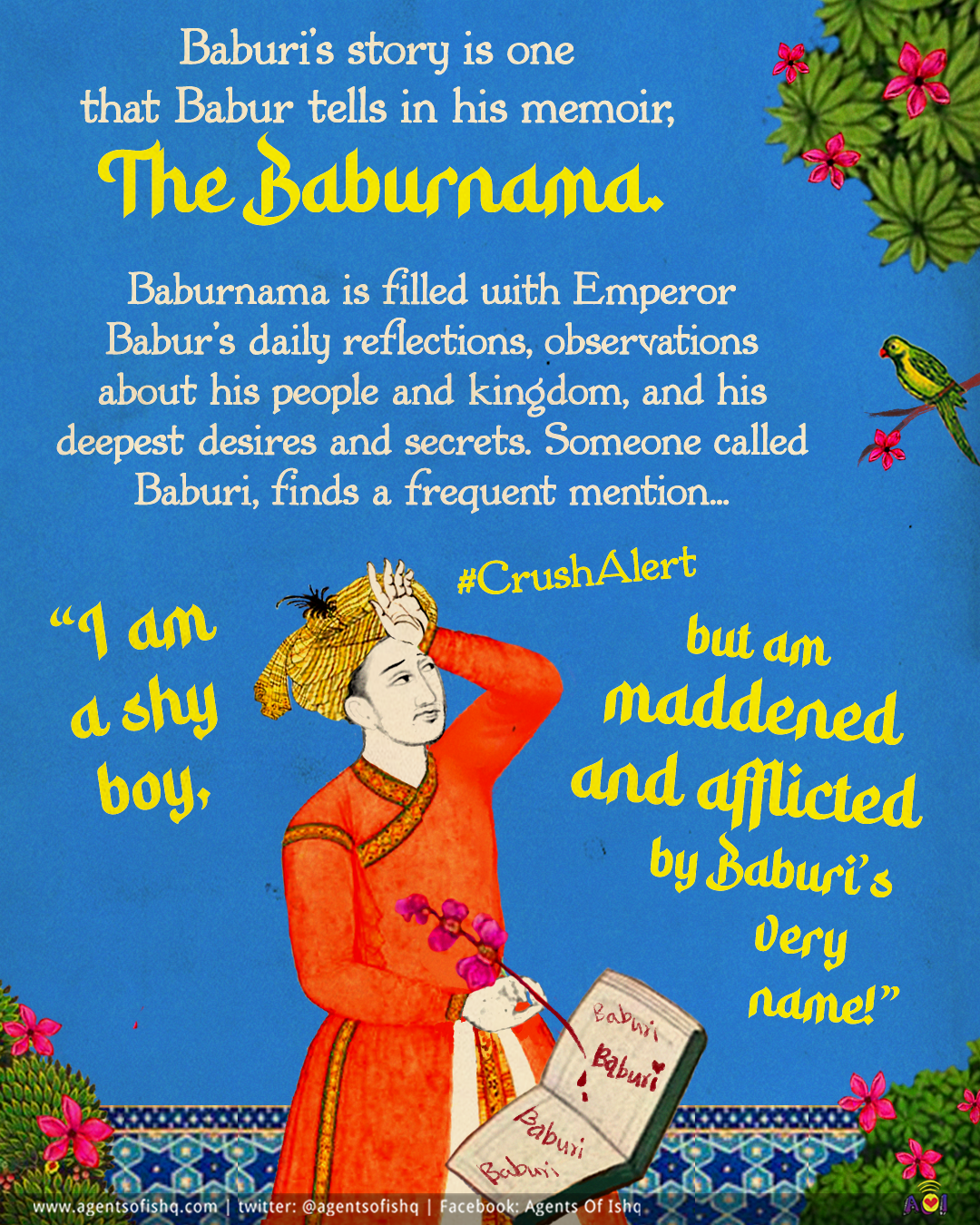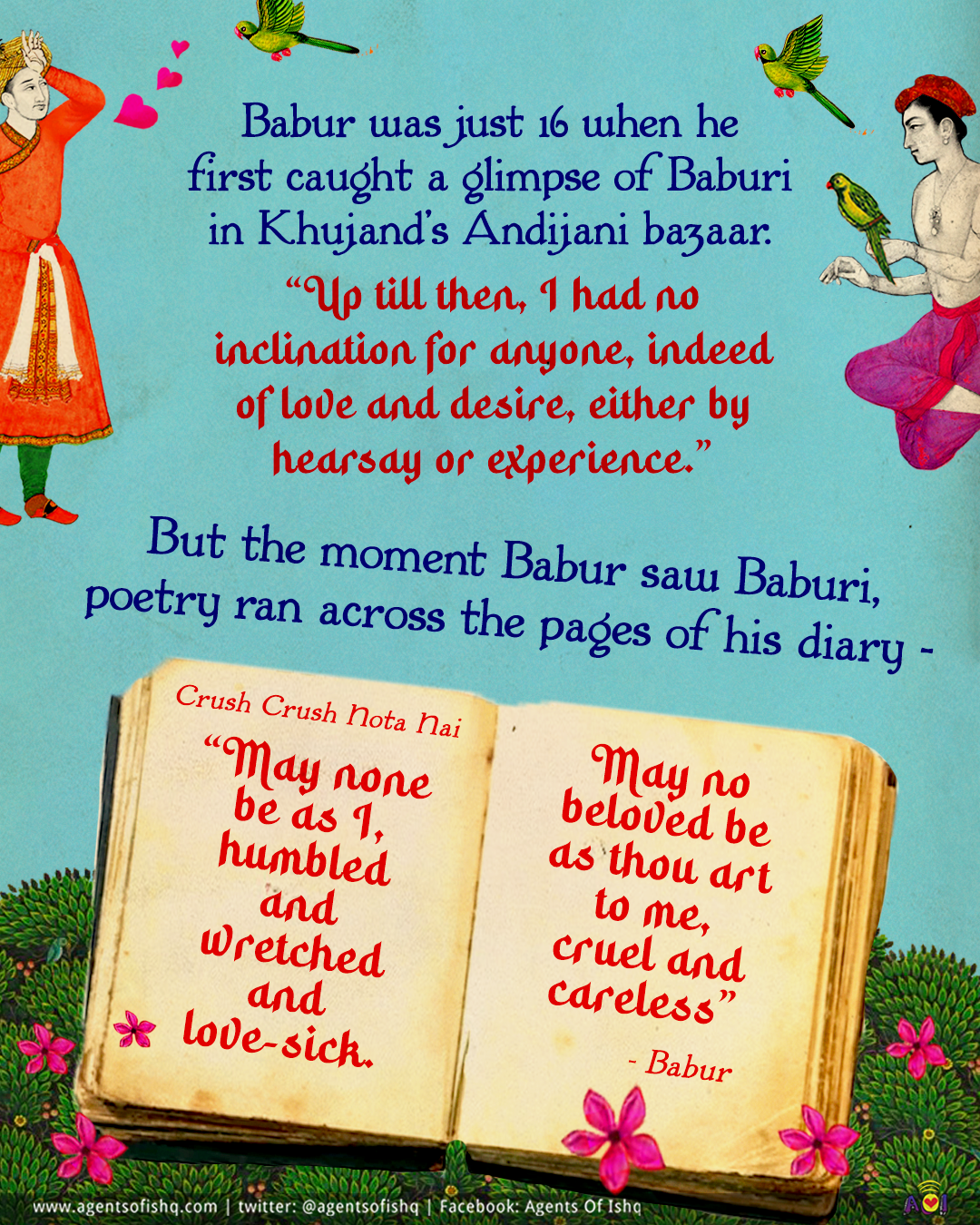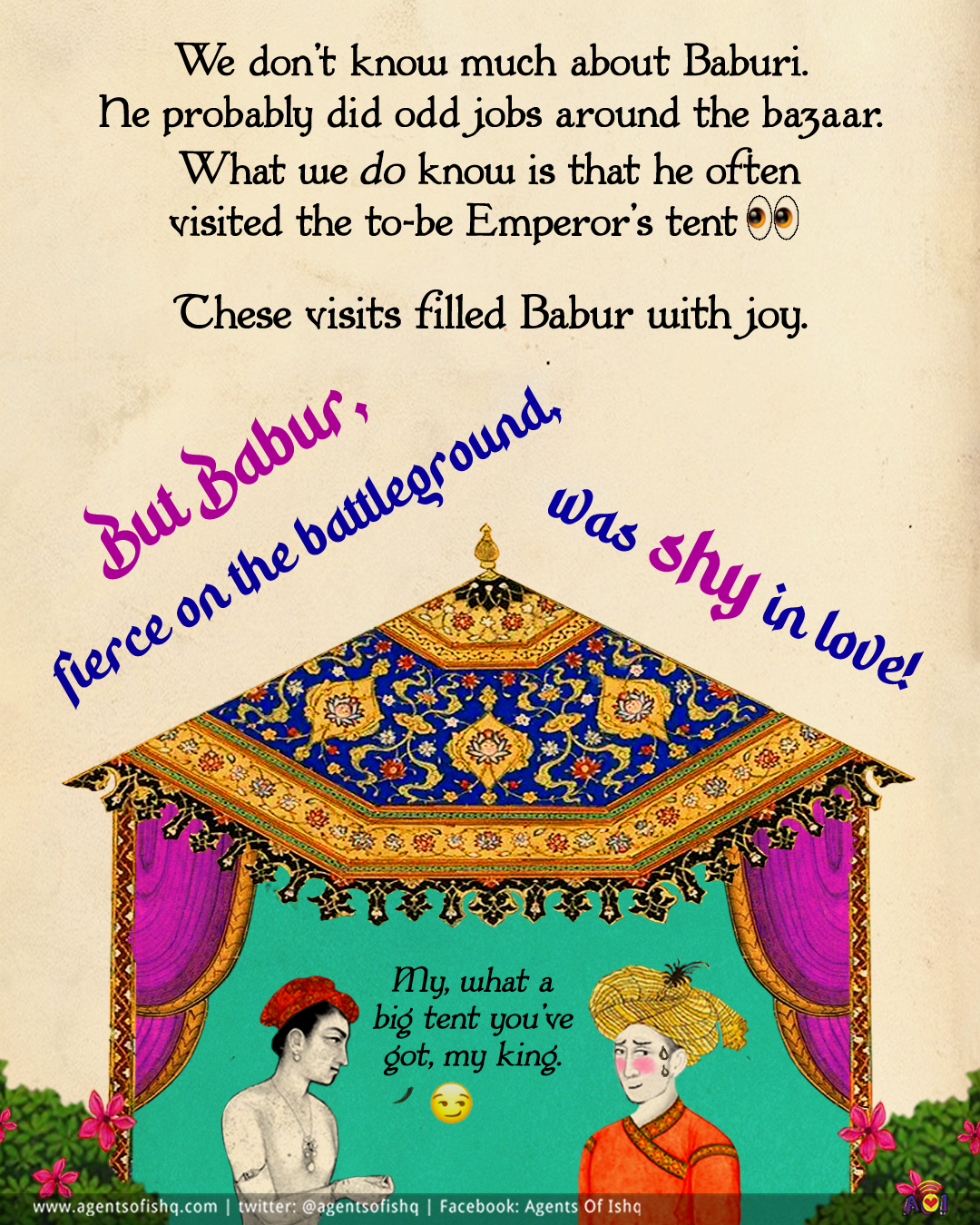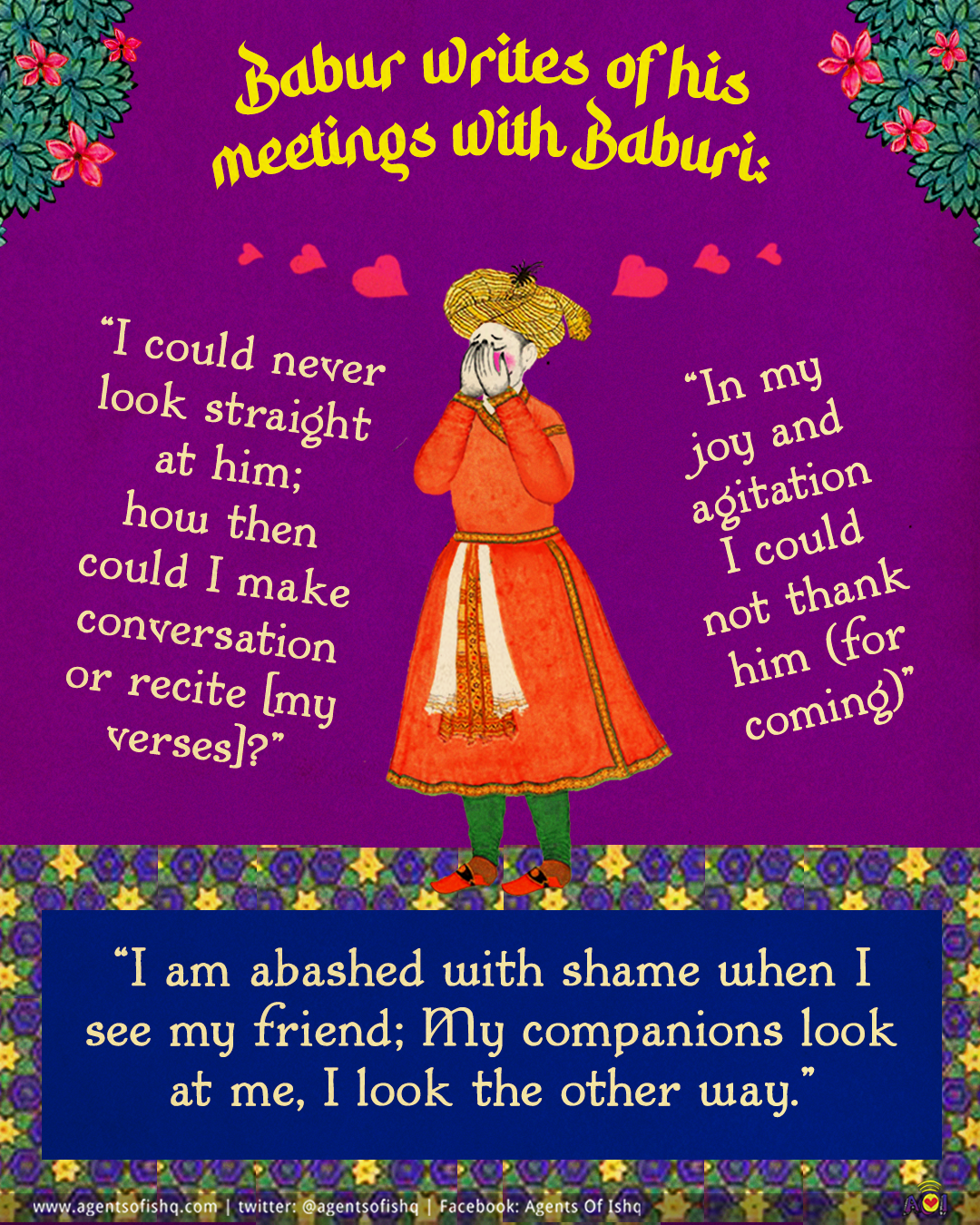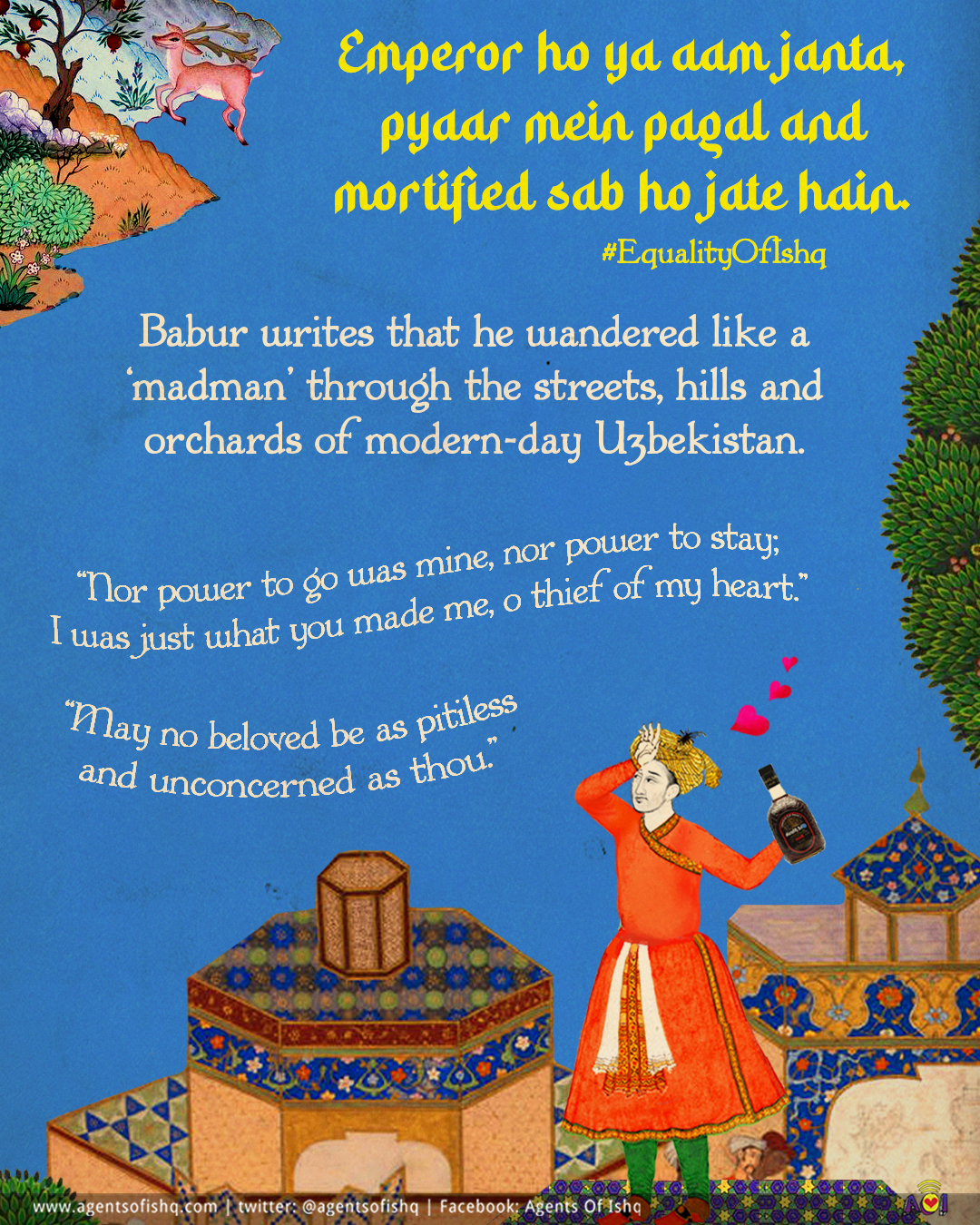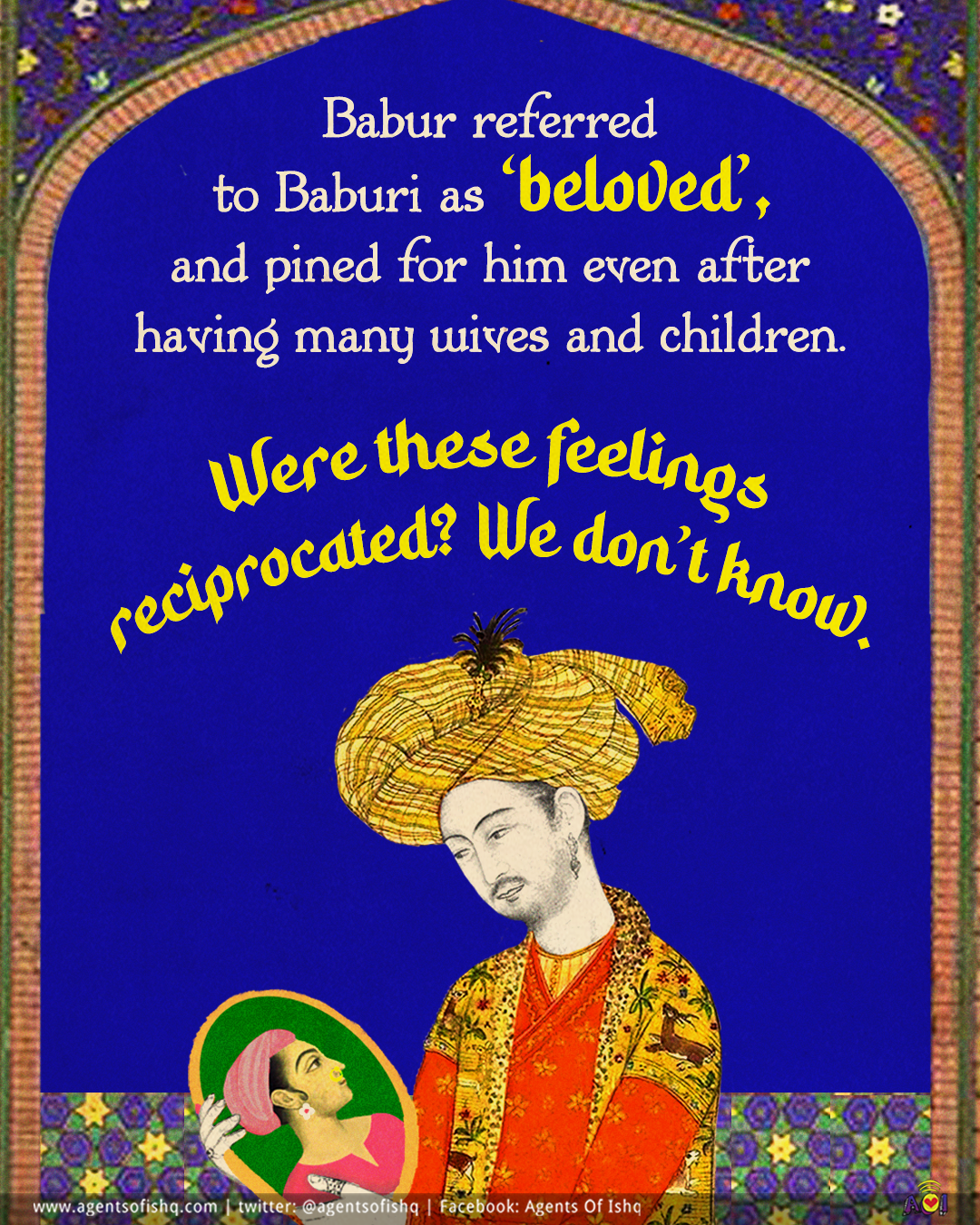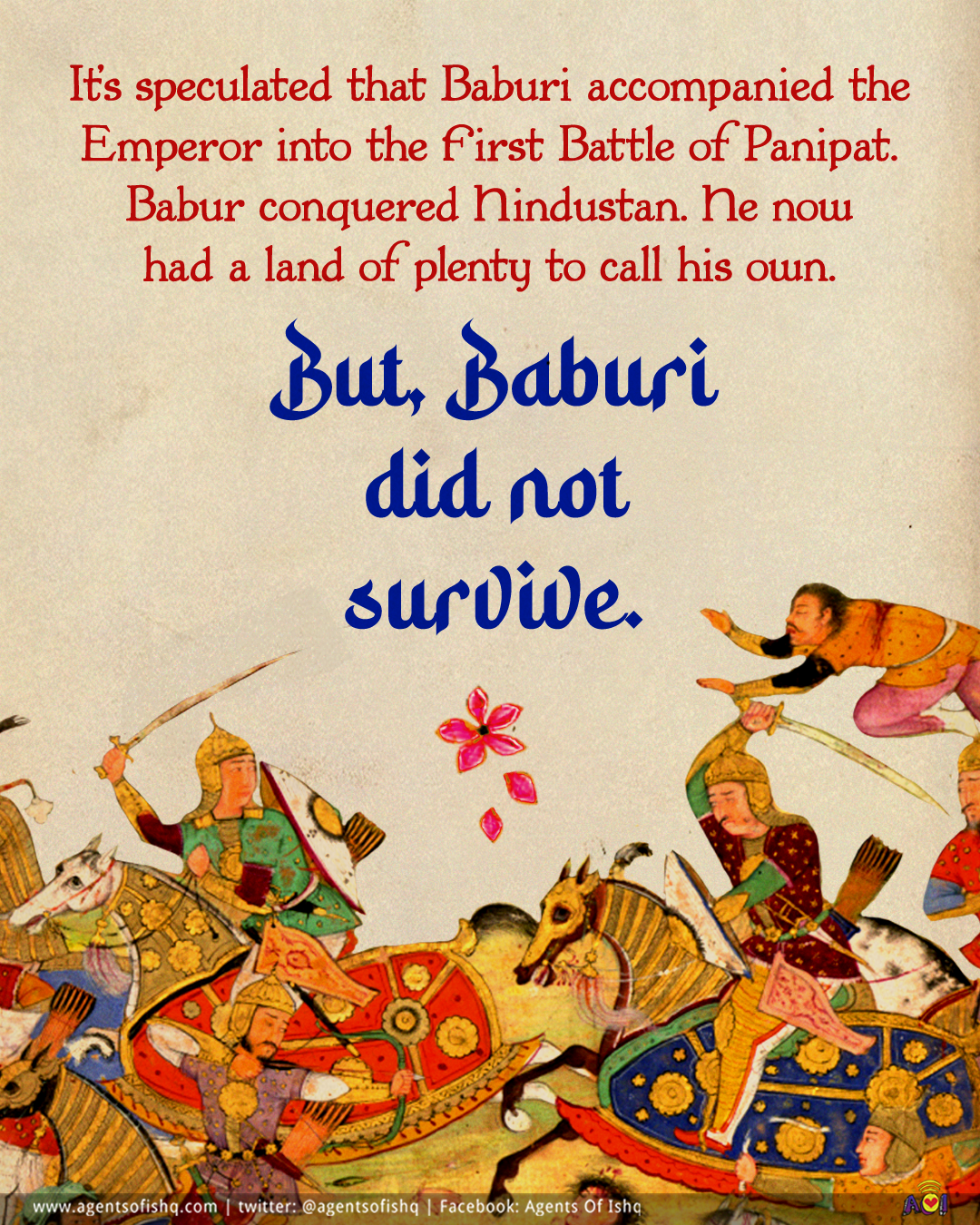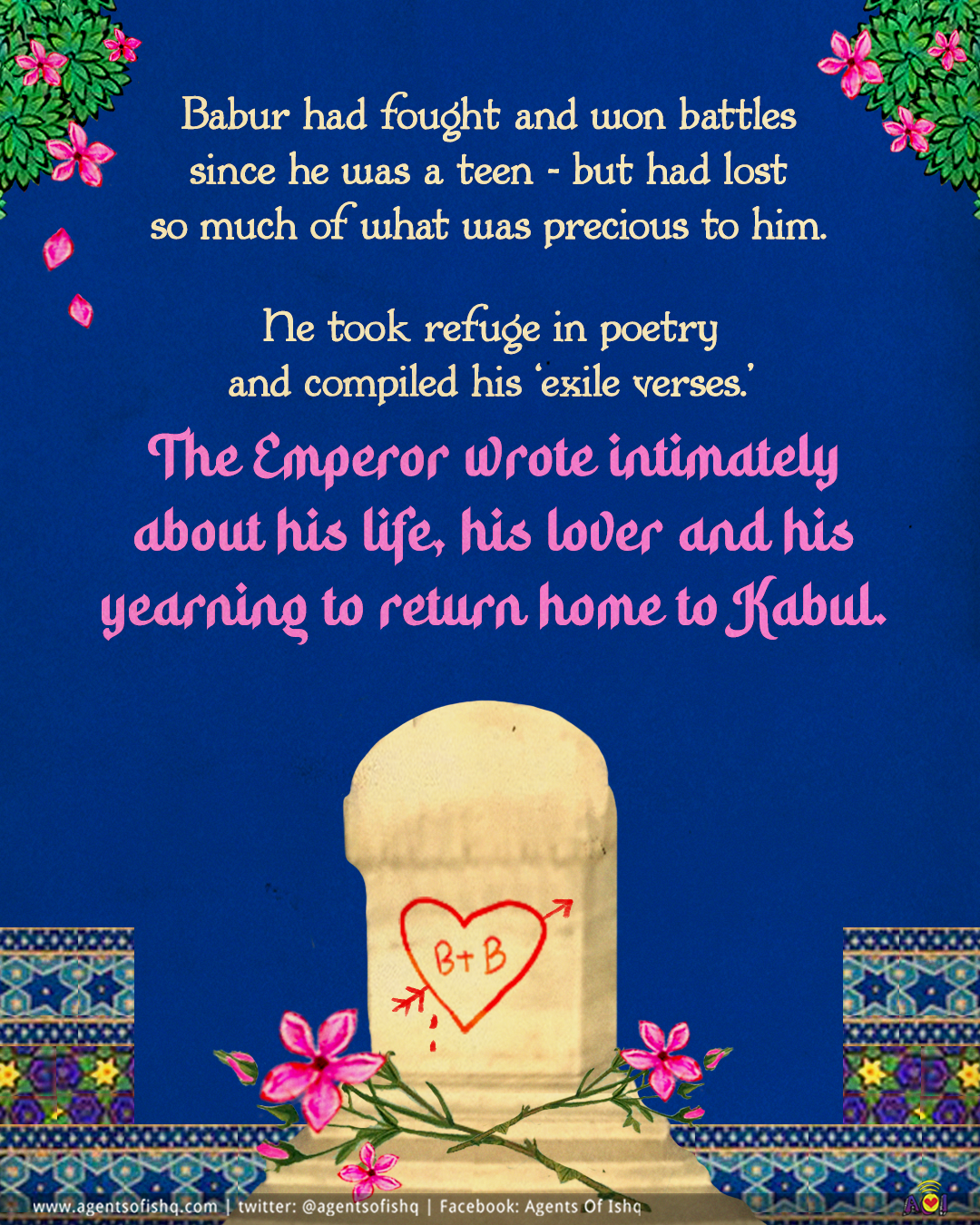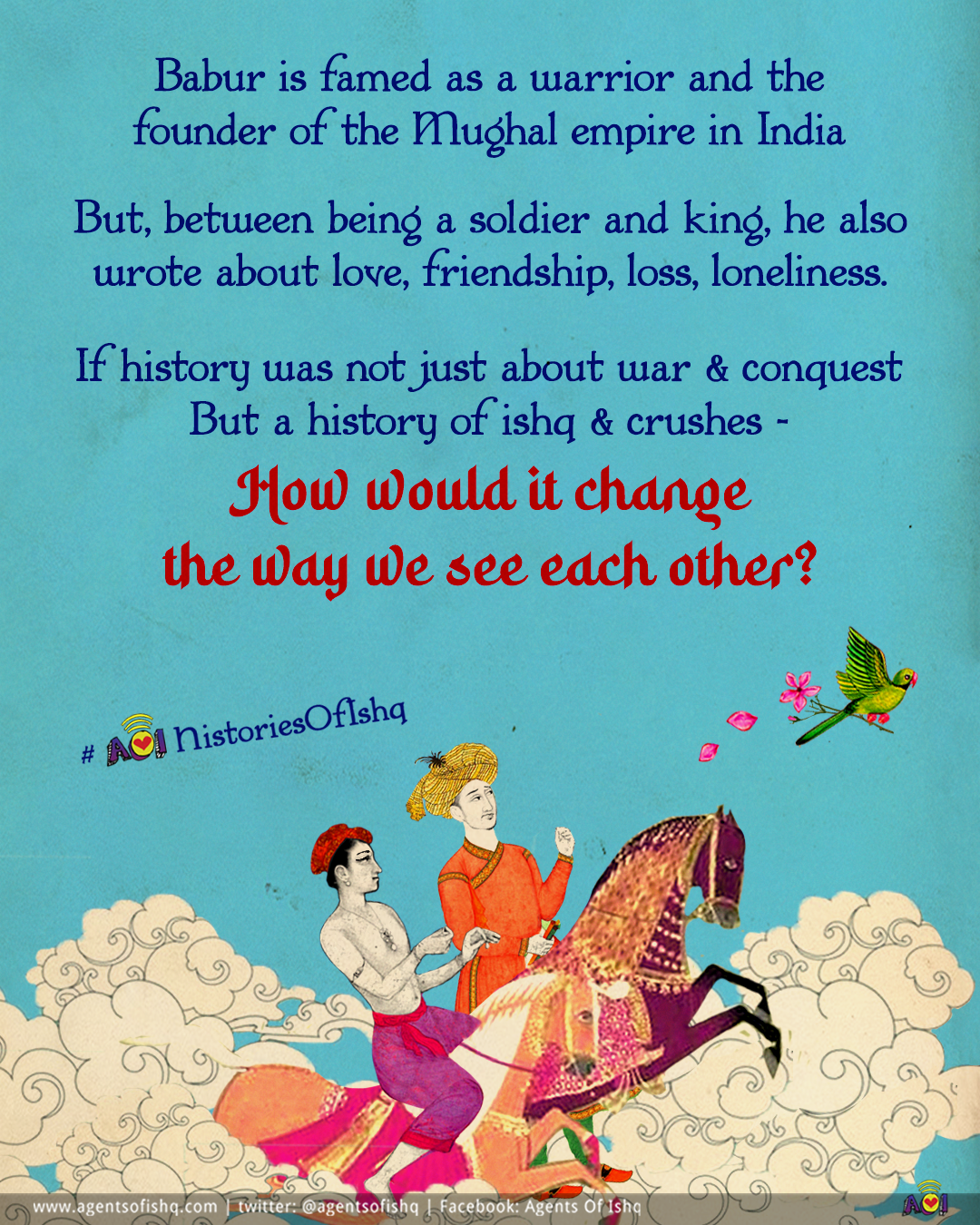Card 1:
Image Description:
The centre contains a mughal miniature of Babur-dressed in red attire and a yellow turban admiring a portrait of lover Baburi-dressed in pink attire and a pink turban. We see a statue of cupid toward the centre-right pointing his bow and arrow towards Babur. The two bottom corners contain bushes with pink flowers. The background of the card is a Persian miniature design in blue.
Text on Card Reads:
The Boy Who Stole Babur's Heart
feat. Babur
…and Baburi
Mughal Era ka Premi No. 1?
Card 2:
Image Description:
The centre contains a mughal miniature of Babur in full figure. The figure seems to be in distress with one hand resting on his forehead and the other hand holds a hydrangea being used as a pen. The notebook beneath the pen has the name “ Baburi” written multiple times in red. The bottom two corners and the upper right corner contain bushes with pink flowers. The background of the card is a Persian miniature design in blue.
Text on Card Reads:
Baburi's story is one that Babur tells in his memoir, The Baburnama.
Baburnama is filled with Emperor Babur's daily reflections, observations about his people and kingdom, and his deepest desires and secrets. Someone called Baburi, finds a frequent mention...
"I am a shy boy,
but am maddened and afflicted by Baburi's Very name!"
#CrushAlert
Card 3:
Image Description:
The upper left corner contains a distressed miniature painting of Babur. The upper right corner contains a painting of Baburi sending multiple parrots towards Babur. The bottom of the card contains a notebook kept on bushes with pink flowers.
The notebook reads: Crush Crush hota hai
"May none be as I, humbled and Wretched and love-sick.
May no beloved be as thou art to me, cruel and careless"
-Babur
Text on Card Reads:
Babur was just 16 when he first caught a glimpse of Baburi in Khujand's Andijani bazaar.
"Up till then, I had no inclination for anyone, indeed of love and desire, either by hearsay or experience."
But the moment Babur saw Baburi, poetry ran across the pages of his diary
Card 4:
Image Description:
The centre of the cards containsBabur and Baburi sitting under a minara shaped tent. A mughal miniature of Baburi flirting with a shy, Babur with flushed cheeks. Baburi says: "My, what a big tent you've got, my king."
Text on Card Reads:
We don't know much about Baburi. He probably did odd jobs around the bazaar. What we do know is that he often visited the to-be Emperor's tent
These visits filled Babur with joy.
But Babur, fierce on the battleground,
Was shy in love!
Card 5:
Image Description:
A card with purple persian miniature background, contains a full figured Babur covering his face with both his hand- out of embarrassment and the feeling of shyness. We see a hint of flushed cheeks in pink. The two upper corners contain bushes with pink flowers.
Text on Card Reads:
Babur Writes of his meetings with Baburi:
"I could never look straight at him; how then could I make conversation or recite [my verses]?"
"In my joy and agitation I could not thank him (for coming)"
"I am abashed with shame when I see my friend; My companions look at me, I look the other way."
Card 6:
Image Description:
The upper left corner contains illustrations of mountains, trees and a deer. The bottom right corner contains persian miniatures of a city's architecture- representing Uzbekistan. In the midst, we see a distressed Babur with a bottle of alcohol.
Text on Card Reads:
Emperor ho ya aam janta, pyaar mein pagal and mortified sab ho jate hain.
#EqualityOfishq
Babur writes that he wandered like a 'madman' through the streets, hills and orchards of modern-day Uzbekistan.
"Nor power to go was mine, nor power to stay, I was just what you made me, o thief of my heart."
May no beloved be as pitiless and unconcerned as thou."
Card 7:
Image Description:
The centre contains a mughal miniature of Babur-dressed in red attire and a yellow turban admiring a portrait of lover Baburi-dressed in pink attire and a pink turban. The background of the card is a Persian miniature design in blue.
Text on Card Reads:
Babur referred to Baburi as 'beloved', and pined for him even after having many wives and children.
Were these feelings reciprocated? We don't know.
Card 8:
Image Description:
The card contains illustrations of war. Men in armor, riding horses, with swords in their hands and men with bows and arrows.
Text on Card Reads:
It's speculated that Baburi accompanied the Emperor into the first Battle of Panipat. Babur conquered Hindustan. He now had a land of plenty to call his own.
But, Baburi did not survive.
Card 9:
Image Description:
The bottom centre contains a grave adorned with pink flowers. The letters “B + B” are scribbled on the grave inside a heart with an arrow going through its middle. The background of the card is a Persian miniature design in blue. The two upper corners contain bushes with pink flowers.
Text on Card Reads:
Babur had fought and won battles since he was a teen but had lost so much of what was precious to him.
He took refuge in poetry and compiled his 'exile verses.'
The Emperor wrote intimately about his life, his lover and his yearning to return home to Kabul.
Card 10:
Image Description:
The bottom of the card contains clouds with light blue background representing the skies. In the centre we see illustrations of Babur and Baburi riding separate horses and a parrot with a pink flower guiding their way.
Text on Card Reads:
Babur is famed as a warrior and the founder of the Mughal empire in India
But, between being a soldier and king, he also
wrote about love, friendship, loss, loneliness.
If history was not just about war & conquest
But a history of ishq & crushes
How would it change the way we see each other?
#AOIhistoriesOfIshq
Sources:
An Emperor with Foibles (The Hindu)
Aabhas K. Maldahiyar 'Babur: The Chessboard King' (2024).
Babur-Nama. Translated from the original Turki Text of
Zahiru'd-din Muhammad Babur Padshah by Annette Susannah Beveridge (1922).
Ali Anooshahr, ‘The King Who Would be Man: The Gender Roles of the Warrior King in Early Mughal History’, in Journal of the Royal Asiatic Society
Shreya Gupta. “Away from Home, How Babur Versified His Pain of Exile and Homelessness” The Wire.
Boys for Winter, Girls for Summer: The Open and Fluid Sexualities of the Mughal and Ottoman Emperors. Easy History.


